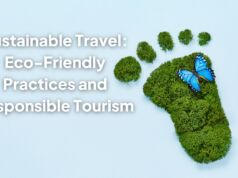Traveling is a thrilling experience that allows us to explore new destinations, cultures, and cuisines. Whether you’re embarking on a backpacking adventure through Southeast Asia, planning a rugged hiking trip in the Rockies, or gearing up for an exciting city escape, maintaining your energy, stamina, and overall well-being is crucial.
For many adventurous travelers, optimizing their testosterone levels through supplements is a strategy to enhance their travel experiences. In this article, we’ll delve into the significance of testosterone, how travel can impact hormone levels, and explore supplements and lifestyle choices that can support a high-energy and memorable journey.
Understanding Testosterone
Testosterone is a hormone primarily associated with male sexual health and development. However, it plays a pivotal role in both men and women’s overall health, influencing various aspects of the body, such as muscle mass, bone density, mood, and energy levels. Testosterone levels tend to be higher in men, and it’s often referred to as the “male hormone,” although women also produce it in smaller amounts.
The Impact of Travel on Hormone Levels
Traveling can be physically demanding, involving long flights, irregular sleep patterns, and exposure to new environments. These factors can contribute to a temporary disruption of hormone balance, affecting cortisol and testosterone levels.
Sleep Disruption: Jet lag and changes in time zones can disrupt the body’s internal clock, leading to sleep disturbances. Poor sleep quality can result in elevated cortisol levels and reduced testosterone production.
Stress and Cortisol: Travel can be stressful, especially when dealing with flight delays, language barriers, or unfamiliar situations. Chronic stress can lead to increased cortisol production, which can have a negative impact on testosterone levels.
Diet and Nutrition: Changes in diet and eating patterns during travel can affect nutrient intake. Deficiencies in essential vitamins and minerals can contribute to hormonal imbalances.
Supplements for Maintaining Testosterone Levels
To counteract the potential hormonal fluctuations during travel and ensure a high-energy journey, consider the following supplements:
Vitamin D: Exposure to sunlight, crucial for vitamin D production, may be limited during travel. Vitamin D is essential for testosterone production, so consider vitamin D supplements to maintain optimal levels.
Zinc: Zinc is a mineral that plays a vital role in testosterone production. It can be found in various foods, but travelers may not have access to zinc-rich options. Zinc supplements can help support testosterone levels.
Magnesium: Magnesium is involved in hundreds of biochemical reactions in the body, including those related to hormone regulation. It can be beneficial for maintaining overall health and hormone balance during travel.
D-Aspartic Acid: This amino acid has been shown to boost testosterone levels, making it a potential supplement for travelers looking to maintain their energy and vitality.
Ashwagandha: An adaptogenic herb, ashwagandha, may help the body adapt to stress and reduce cortisol levels, thereby indirectly supporting healthy testosterone levels.
Maca Root: Maca is a plant known for its potential to enhance energy and stamina. Some studies suggest it may also support healthy testosterone levels.
Lifestyle Choices for Hormonal Balance
In addition to supplements, adopting certain lifestyle choices can contribute to hormonal balance while traveling:
Stay Hydrated: Dehydration can disrupt hormone levels, so ensure you’re drinking enough water throughout your journey.
Balanced Diet: Whenever possible, aim for a balanced diet rich in nutrients. Include foods like lean proteins, nuts, seeds, and vegetables that support hormone production.
Regular Exercise: Incorporate physical activity into your travel itinerary. Exercise can help maintain healthy hormone levels and improve mood and energy.
Adequate Sleep: Prioritize sleep, even when dealing with jet lag. Adequate rest is essential for hormone regulation and overall well-being.
Stress Management: Engage in relaxation techniques such as meditation, deep breathing, or yoga to manage stress and lower cortisol levels.
Conclusion
Traveling is an incredible adventure that can enrich your life in many ways. To make the most of your journeys and maintain your energy and vitality while on the road, consider the impact of travel on your hormone levels, especially testosterone.
By incorporating supplements and adopting healthy lifestyle choices, you can support hormonal balance and ensure that your travels are not only adventurous but also physically and mentally fulfilling.
Remember that before starting any supplementation regimen, it’s advisable to consult with a healthcare professional to determine the best approach for your individual needs and circumstances. Check out The Times of Israel’s roundup of top testosterone boosters that tackle fatigue and weakness while traveling.













